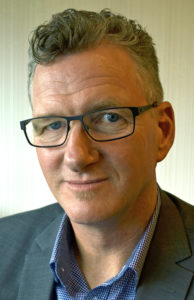Sebastian Harvey is a facilitator for iHR Australia, delivering programs including Contact Officer and Managing Everyday Performance. As an expert in communication, Sebastian coaches people on how to have better conversations, specialising in communication regarding difficult issues such as performance, conflict, bullying and harassment. With extensive experience in the Government, Public and Tertiary Education Sectors, Sebastian’s career began in recruitment, working his way up to National Recruitment Manager for the Weather Bureau in Melbourne. After completing his Bachelor of Arts, Sebastian developed a strong interest in human behaviour studying Psychology. This ultimately led him into Learning & Development, providing training…

Sebastian Harvey is a facilitator for iHR Australia, delivering programs including Contact Officer and Managing Everyday Performance.
As an expert in communication, Sebastian coaches people on how to have better conversations, specialising in communication regarding difficult issues such as performance, conflict, bullying and harassment.
With extensive experience in the Government, Public and Tertiary Education Sectors, Sebastian’s career began in recruitment, working his way up to National Recruitment Manager for the Weather Bureau in Melbourne.

After completing his Bachelor of Arts, Sebastian developed a strong interest in human behaviour studying Psychology. This ultimately led him into Learning & Development, providing training in leadership and non-technical development to staff, such as scientists and technical officers, at the bureau.
Sebastian’s next career move was to RMIT, where he spent 3 years in Organisational Development, before starting his own leadership development consultancy, working with Telstra, as well as organisations in the retail and finance sectors.
We chatted to Sebastian to understand more about the benefits of participating in his programs.
What are the challenges and difficulties of Performance Management?
In my programs, I often refer to the ability to be open minded. Being open minded is something we often take for granted, where it’s actually something you have to be really proactive about.
In a performance management context, it’s absolutely critical, both from a legal point of view and a fairness point of view to be able to really hear what the other persons side of the story is. Yet, people have very deeply rooted biases. The challenge is to recognise when those biases are obstructing and preventing us from being open minded with people we are dealing with.
In Managing Everyday Performance, participants learn about their own unconscious biases and the importance of being open minded.
What do participants gain from the program Managing Everyday Performance?
Participants will learn the importance of having the right mindset. They will also develop techniques to help them prepare for performance management situations and plan difficult conversations, such as where a manger needs to address a performance issue.
Participants also have the opportunity to apply their learning by planning and preparing for a discussion, as well as practicing having difficult conversations in a workshop with our ac
tors.
What do you enjoy doing outside of work?
I’m a big Manchester City and Collingwood supporter, which comes in handy when joking about people’s perceived biases.
In my early days I was involved in the music industry, both as a musician and on the production side.
My son, who has an intellectual disability, participates in a sports program called Inclusive Sports Training, so in my spare time I buddy as a parent when they do their activities. I’m also involved in my local church and compete in triathlons as a means of keeping fit.
Recent articles
![Lee Witherden v DP World Sydney Limited [2025] FWC 294 (2) Workplace policies](https://ihraustralia.com/wp-content/uploads/bb-plugin/cache/Lee-Witherden-v-DP-World-Sydney-Limited-2025-FWC-294-2-1024x539-landscape-dc731230e07743843bfa2c830cc42561-.png)
Smart Workplace Policies, Stronger Cultures: Compliance Made Clear


